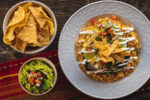What is Sustainable Fishing?
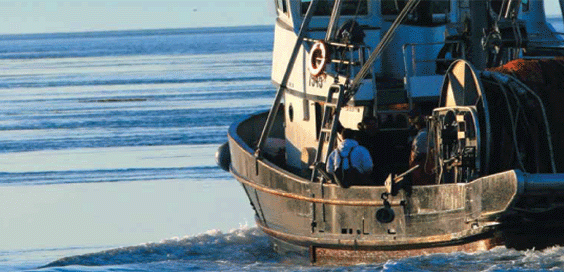
Never Mind the Pollocks
Now that battery farming has rightly taken the super-chef kicking, we look at the UK’s declining seafood stocks – and give some ethical pointers towards a decent plate of fish and chips…
What does sustainable mean anyway?
Declining fish stocks mean that many over-fished fisheries cannot replace stocks quickly enough and so species are either severely depleted or in some cases in danger of dying out completely. Well managed fisheries will set quotas for fishing so the remaining fish have a chance to reproduce and grow to maturity. As the average cod takes three years to come to maturity this is crucial. Large-scale intensive fishing methods such as deep sea trawling mean that other species are caught as by-catch and the seabed is damaged.
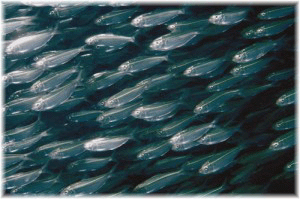 So is fish completely off the menu?
So is fish completely off the menu?
No, you just have to be a bit more careful about what you buy. If you are in a fishmongers, ask where that day’s catch is from. Like a good butcher, they should know the provenance of their fish. In the supermarket look for the Marine Stewardship Council (MSC blue label) which means that the fish has been sourced from sustainable stocks. Also, if you can, find out the method of catching – selective catching such as line-caught or diver-caught is best.
“Badly run salmon farms have been compared to battery chicken farms”
What about the farmed stuff – that’s ok isn’t it?
Farming fish or aquaculture has good and bad sides. Salmon is one of the most widely farmed species but has had problems in the past. Sea lice can thrive in packed cages and can infect wild species. Escaped farmed fish can enter the wild salmon population, crossbreed and affect the gene pool. Some badly run salmon farms have been compared to battery chicken farms as the cramped conditions mean the fish can barely swim, become fatty and often bite and attack other fish.
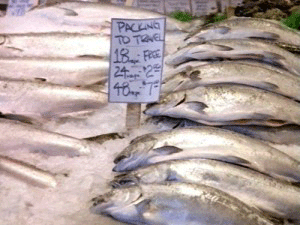 Buy organically farmed salmon, certified by the Soil Association or MSC certified wild Alaskan salmon which is fished from sustainable stocks. Cod fans can buy organically farmed No Catch cod, from the Shetlands.
Buy organically farmed salmon, certified by the Soil Association or MSC certified wild Alaskan salmon which is fished from sustainable stocks. Cod fans can buy organically farmed No Catch cod, from the Shetlands.
And prawns?
That’s another story. The majority of warm-water prawns such as tiger prawns are farmed in south-east Asia. In order to prepare the land for farming acres of mangrove are destroyed having a devastating effect on local wildlife. Look for organically farmed prawns from Ecuador or Madagascar or buy the tiny sweet cold water prawns fished in the icy waters of the North Sea.
“Labelling is becoming clearer and supermarkets offer ethical choices”
What if I just want fish and chips?
You’ll have to be a bit choosier about where you buy, but it is possible to get an ethical plate of fish and chips. Last year the Loch Fyne chain ran an ‘alternatives’ menu featuring gunard, whiting and pollack and continues to use only fish caught from sustainable stocks. Tom Aikens has just opened Tom’s Place takeaway which uses only sustainable catch. Check if your local offers an alternative to cod and haddock.
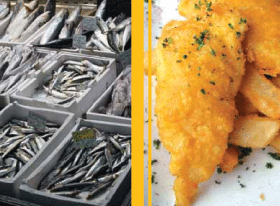 It’s all so confusing – how do I know what’s in and what’s out?
It’s all so confusing – how do I know what’s in and what’s out?
For a really up to date list of fish to eat and avoid go to goodfishguide.org which also provides alternative suggestions to buy. The MSC website eng.msc.org has a comprehensive list of all supermarket products containing sustainable fish.
The good news is labelling is becoming clearer and supermarkets are keen to offer ethical choices. At the end of the day it’s up to you the shopper to vote with your basket and avoid buying dodgy fish.
Some alternative fish and how to cook them:
Pollock – a member of the cod family, so very similar – dip skinless fillets in a beer batter and deep fry until crisp and golden.
Gurnard – similar to red mullet, the firm white flesh loves Mediterranean flavours. Roast in the oven on a bed of cherry tomatoes, garlic and red onion.
New Zealand hoki – put a handful of parsley, mint and basil leaves in a food processor with garlic, capers anchovies and lots of olive oil. Blend to a sauce and drizzle over the grilled hoki.
Cornish line caught mackerel – rub mackerel fillets with oil then sprinkle with crushed cumin and coriander seeds. Grill and serve with cucumber, tomato and onion salad and lemon wedges. Mackeral fishing can also be a fun day out with the family. Have a read of this blog post on the best surf casting reel to check out what gear you will need.

